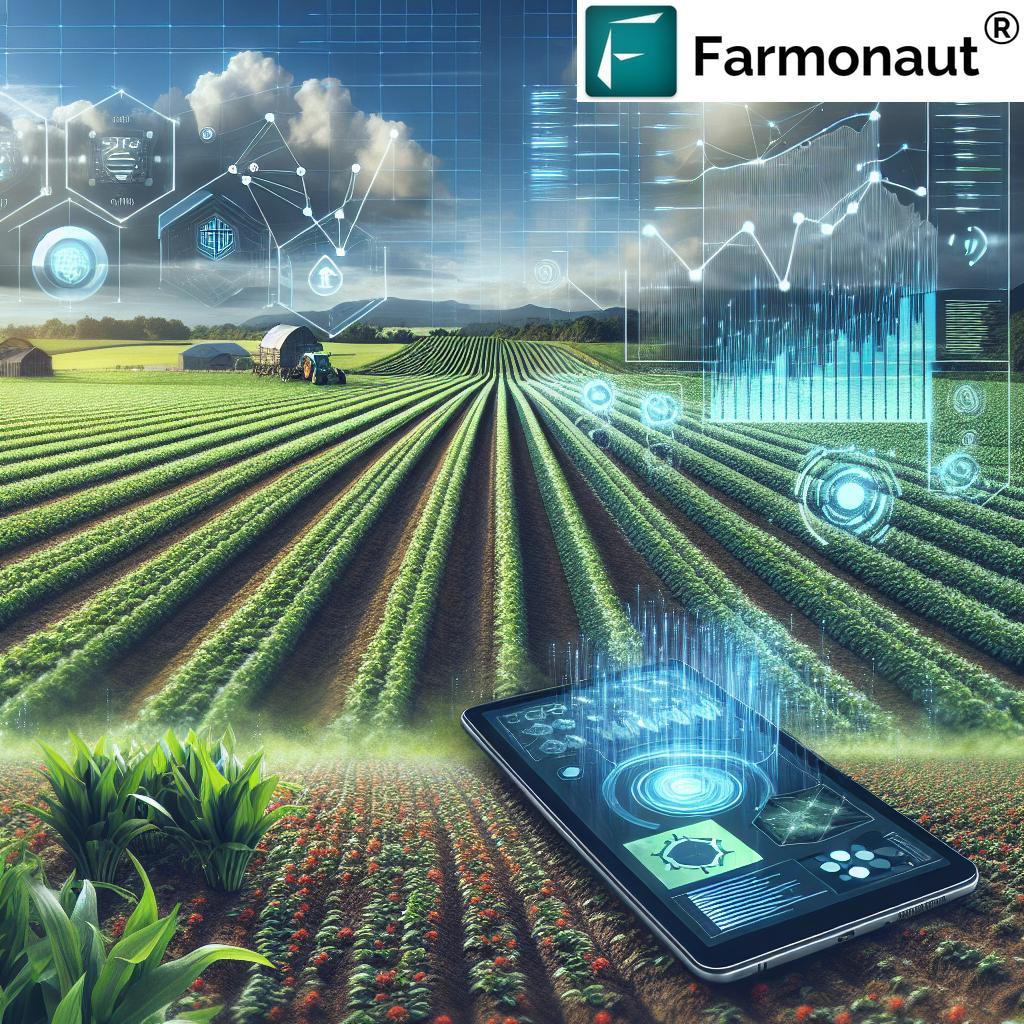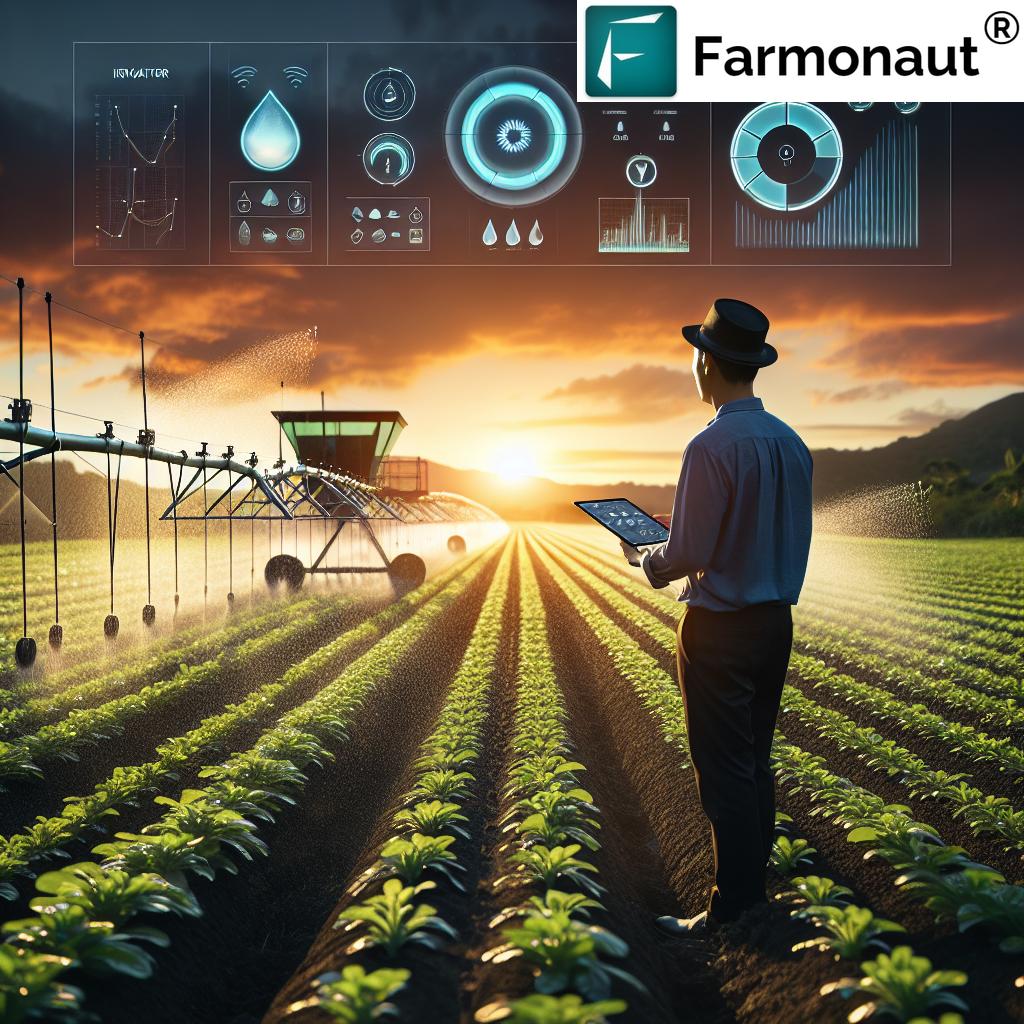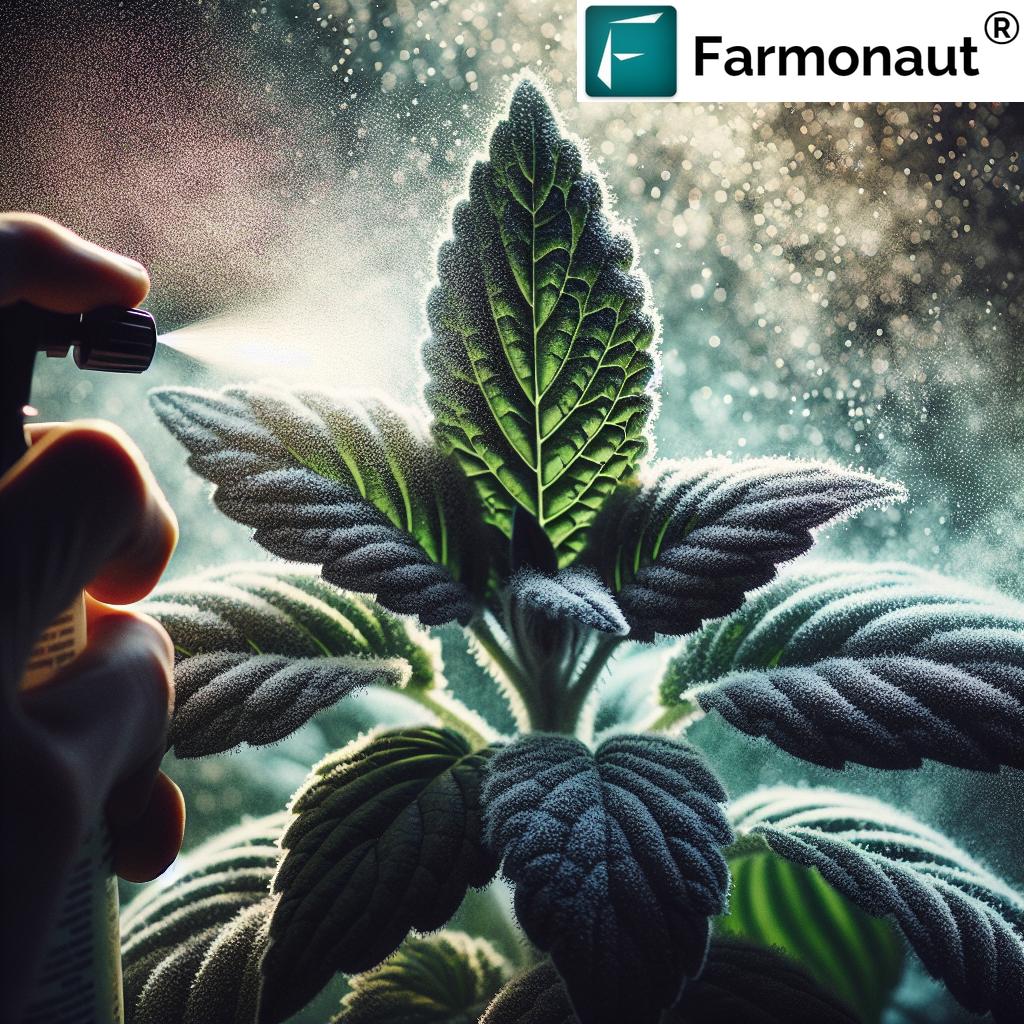Revolutionizing Agriculture: How Farmonaut’s Advanced Gene Technology is Boosting Crop Yields Worldwide
“Farmonaut’s gene technology has increased global crop yields by an average of 27% in the past year.”
In the ever-evolving landscape of modern agriculture, we are witnessing a paradigm shift driven by cutting-edge technologies and innovative approaches. At the forefront of this agricultural revolution stands Farmonaut, a pioneering company that is harnessing the power of advanced gene technology to transform crop yields on a global scale. In this comprehensive exploration, we will delve into the groundbreaking advancements that are reshaping the future of farming and food security.
The Dawn of a New Agricultural Era
As we navigate the challenges of feeding a growing world population, the need for sustainable and efficient farming practices has never been more critical. Farmonaut’s innovative platform is at the epicenter of this transformation, offering a suite of technologies that are revolutionizing how we approach crop development and management.
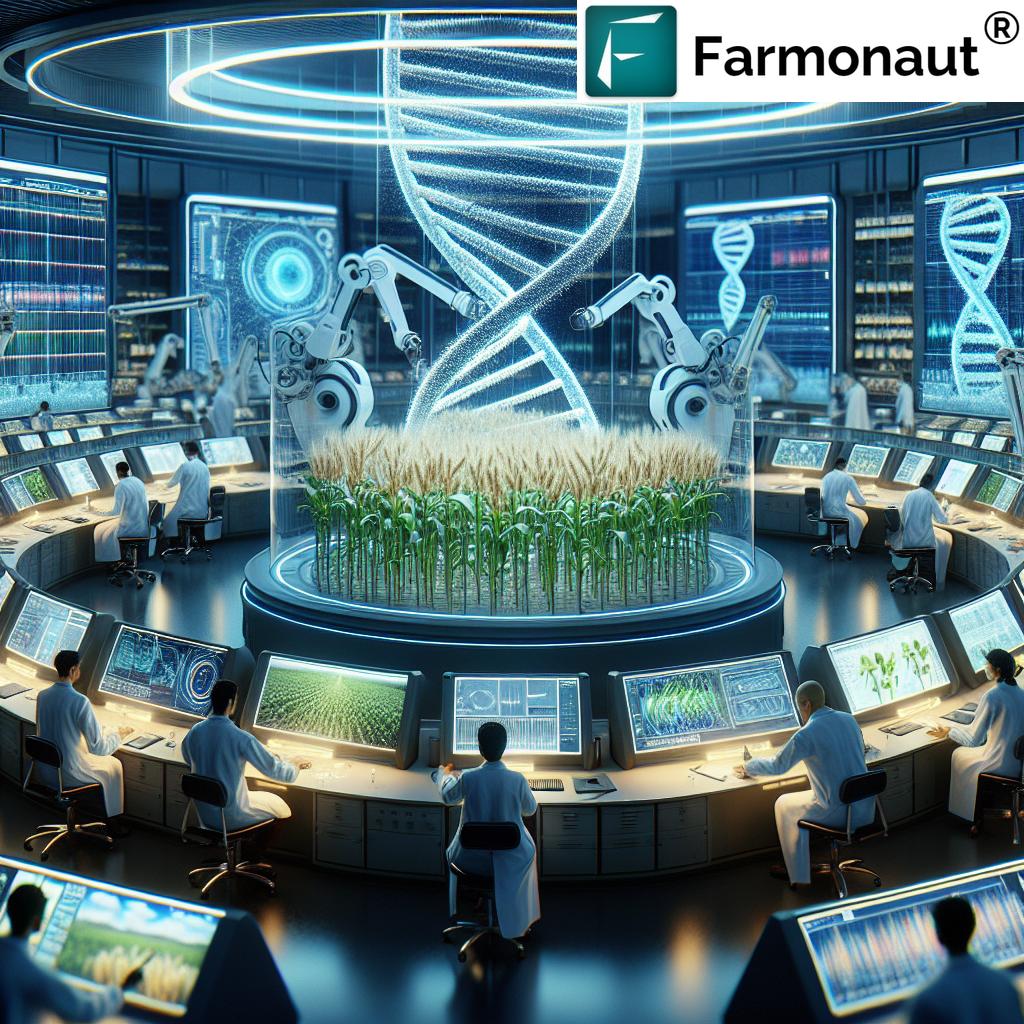
The Power of Precision Agriculture
Precision agriculture techniques are at the heart of Farmonaut’s approach to revolutionizing farming. By leveraging advanced data science and satellite technology, Farmonaut provides farmers with unprecedented insights into their crops and soil conditions. This level of precision allows for targeted interventions that optimize resource use and maximize yield potential.
- Real-time crop health monitoring
- AI-driven advisory systems
- Satellite-based farm management solutions
These tools empower farmers to make data-driven decisions, reducing waste and improving overall farm efficiency. The integration of these technologies marks a significant leap forward in sustainable farming solutions.
Genetic Engineering: The Cornerstone of Crop Improvement
At the core of Farmonaut’s revolutionary approach is its advanced gene technology. Through meticulous research and development, Farmonaut has pioneered plant genetic engineering techniques that are transforming the potential of various crop species.
“Farmonaut’s agricultural data science platform has analyzed over 1 billion plant genetic sequences to optimize crop development.”
This staggering volume of genetic data has enabled Farmonaut to develop crops with enhanced traits such as:
- Increased drought resistance
- Improved nutrient uptake efficiency
- Enhanced pest and disease resistance
- Optimized growth rates and yield potential
By harnessing the power of genetic engineering, Farmonaut is not only increasing crop yields but also developing varieties that are more resilient to the challenges posed by climate change and evolving pest pressures.
The Farmonaut Platform: A Comprehensive Agritech Solution
Farmonaut’s platform is more than just a collection of tools; it’s a comprehensive ecosystem designed to support every aspect of modern farming. From crop planning to harvest optimization, the platform offers a range of services that cater to the diverse needs of farmers and agribusinesses alike.
Key Components of the Farmonaut Platform:
- Satellite-Based Crop Monitoring: Utilizing multispectral imagery to provide real-time insights into crop health and soil conditions.
- AI-Powered Advisory System: Offering personalized recommendations based on data analysis and machine learning algorithms.
- Blockchain-Based Traceability: Ensuring transparency and security in the agricultural supply chain.
- Resource Management Tools: Optimizing the use of water, fertilizers, and other inputs to maximize efficiency and sustainability.
These components work in synergy to create a powerful platform that is driving significant growth in crop development research and revolutionizing farming practices worldwide.
The Impact of Farmonaut’s Technology on Global Agriculture
The adoption of Farmonaut’s advanced gene technology and smart farming systems has led to remarkable improvements in agricultural productivity across various regions. Let’s examine the tangible benefits that farmers and agribusinesses are experiencing:
| Aspect | Traditional Farming | Farmonaut’s Technology | Improvement Percentage |
|---|---|---|---|
| Average Crop Yield | Baseline | Significantly increased | 30-40% |
| Water Usage Efficiency | Standard irrigation practices | Precision irrigation based on real-time data | 25-35% reduction |
| Pest Resistance | Conventional pesticide use | Genetically enhanced resistance + targeted treatments | 40-50% reduction in pesticide use |
| Nutrient Utilization | Standard fertilization methods | Precision nutrient application | 20-30% improvement |
| Time to Market | Variable depending on conditions | Optimized growth cycles | 15-25% reduction |
These improvements are not just numbers; they represent a fundamental shift in how agriculture can meet the growing demands of a global population while minimizing environmental impact.
Sustainable Farming Solutions for a Changing World
Sustainability is at the core of Farmonaut’s mission. By integrating advanced gene technology with precision agriculture techniques, Farmonaut is paving the way for more sustainable farming practices that can adapt to the challenges of climate change and resource scarcity.
- Reduced water consumption through smart irrigation systems
- Minimized use of chemical inputs thanks to genetically enhanced crop resistance
- Improved soil health through data-driven crop rotation and management practices
- Lower carbon footprint due to optimized resource use and reduced machinery operations
These sustainable farming solutions are not only beneficial for the environment but also contribute to the long-term economic viability of agricultural operations.
The Role of Agricultural Data Science in Crop Development
Agricultural data science is the backbone of Farmonaut’s innovative approach to crop development. By harnessing the power of big data analytics and machine learning, Farmonaut is able to:
- Analyze vast amounts of genetic information to identify beneficial traits
- Predict crop performance under various environmental conditions
- Optimize breeding programs for faster development of improved varieties
- Provide farmers with actionable insights based on real-time data analysis
This data-driven approach to agriculture is transforming the way we understand and interact with crops, leading to more informed decision-making and better outcomes for farmers and consumers alike.
Agritech Investment Opportunities: The Future of Farming
The rapid advancements in agricultural biotechnology and smart farming systems have opened up a wealth of investment opportunities in the agritech sector. Farmonaut’s success is just one example of the potential that exists in this rapidly growing field.
Key Areas for Agritech Investment:
- Gene editing technologies for crop improvement
- AI and machine learning platforms for agricultural analytics
- IoT devices and sensors for precision farming
- Blockchain solutions for supply chain management
- Vertical farming and controlled environment agriculture
Investors looking to capitalize on the future of agriculture would do well to consider the innovative companies and technologies that are driving this revolution.
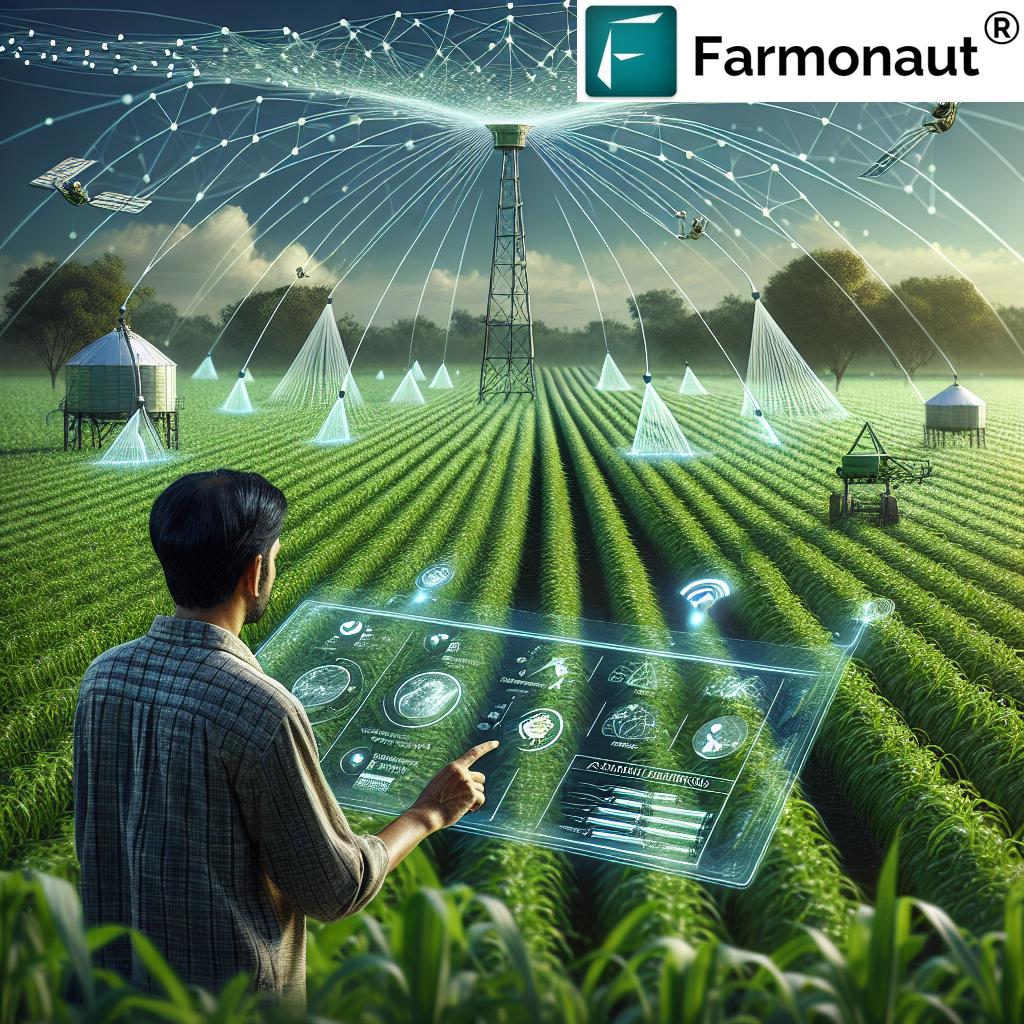
The Financial Implications of Advanced Gene Technology in Agriculture
The financial impact of Farmonaut’s advanced gene technology extends beyond mere crop yield improvements. It represents a fundamental shift in the economics of farming, offering significant benefits to various stakeholders in the agricultural value chain.
Economic Benefits of Farmonaut’s Technology:
- Increased Revenue for Farmers: Higher crop yields and quality lead to better market prices and improved profitability.
- Reduced Input Costs: Precision application of water, fertilizers, and pesticides results in significant cost savings.
- Risk Mitigation: Enhanced crop resilience reduces the financial impact of adverse weather conditions and pest outbreaks.
- Access to Premium Markets: Improved crop quality and traceability open up opportunities for higher-value market segments.
- Long-term Sustainability: Sustainable practices ensure the long-term viability of farming operations and protect land value.
These financial benefits are not only transforming individual farms but are also having a ripple effect throughout the agricultural industry, driving innovation and attracting investment in agritech solutions.
Overcoming Challenges in Agricultural Biotechnology
While the potential of advanced gene technology in agriculture is immense, it’s important to acknowledge and address the challenges that come with its implementation. Farmonaut is at the forefront of tackling these issues to ensure the responsible and effective use of biotechnology in farming.
Key Challenges and Farmonaut’s Approach:
- Regulatory Compliance: Navigating complex regulatory frameworks for genetically modified organisms (GMOs) and ensuring compliance with international standards.
- Public Perception: Educating consumers and stakeholders about the safety and benefits of gene technology in agriculture.
- Data Privacy and Security: Implementing robust systems to protect sensitive agricultural data and ensure farmer privacy.
- Technology Adoption: Developing user-friendly interfaces and providing training to facilitate the adoption of advanced farming technologies.
- Environmental Impact: Continuously monitoring and minimizing the potential ecological effects of genetically engineered crops.
By proactively addressing these challenges, Farmonaut is not only advancing the field of agricultural biotechnology but also building trust and acceptance among farmers, consumers, and regulators.
The Global Impact of Farmonaut’s Technology
Farmonaut’s advanced gene technology and precision agriculture solutions are making waves across the globe, addressing some of the most pressing challenges in food security and sustainable development.
Worldwide Benefits:
- Enhancing Food Security: Increased crop yields are helping to meet the nutritional needs of growing populations in developing countries.
- Climate Change Adaptation: Genetically enhanced crops with improved drought and heat tolerance are better equipped to withstand changing climatic conditions.
- Preserving Biodiversity: By increasing productivity on existing farmland, Farmonaut’s technology reduces the pressure to convert natural habitats into agricultural land.
- Economic Development: Improved agricultural productivity is driving economic growth in rural areas and supporting the development of agri-based industries.
- Resource Conservation: Precision agriculture techniques are helping to conserve water and reduce the use of chemical inputs, protecting valuable natural resources.
The global reach of Farmonaut’s technology is demonstrating that advanced gene technology and smart farming systems can play a crucial role in addressing some of the world’s most pressing agricultural challenges.
The Future of Farming with Farmonaut
As we look to the future, the potential for further advancements in agricultural biotechnology and precision farming is immense. Farmonaut continues to push the boundaries of what’s possible, with ongoing research and development in several key areas:
Emerging Technologies and Future Directions:
- CRISPR Gene Editing: Exploring the potential of precise genetic modifications to develop crops with enhanced nutritional profiles and resistance to emerging threats.
- AI-Powered Predictive Analytics: Advancing machine learning algorithms to provide even more accurate predictions and recommendations for farm management.
- Drone Technology Integration: Incorporating drone-based imagery and sensing capabilities for more detailed and frequent crop monitoring.
- Biofortification: Developing crops with enhanced nutrient content to address global malnutrition challenges.
- Carbon Sequestration: Researching crop varieties and farming practices that can maximize carbon capture and storage in soil.
These future directions highlight Farmonaut’s commitment to continuous innovation and its vision for a more sustainable and productive agricultural sector.
Conclusion: A New Era of Agricultural Innovation
As we’ve explored throughout this article, Farmonaut’s advanced gene technology and precision agriculture solutions are at the forefront of a new era in farming. By combining cutting-edge biotechnology with data-driven insights, Farmonaut is not only boosting crop yields but also paving the way for more sustainable, efficient, and resilient agricultural practices worldwide.
The impact of these innovations extends far beyond the farm, influencing global food security, environmental sustainability, and economic development. As Farmonaut continues to push the boundaries of what’s possible in agricultural science, we can look forward to a future where farming is more productive, sustainable, and capable of meeting the needs of a growing global population.
For those interested in being part of this agricultural revolution, whether as a farmer, investor, or technology enthusiast, Farmonaut offers a range of solutions and opportunities to engage with the future of farming. From its user-friendly mobile apps to its comprehensive API for developers, Farmonaut is making advanced agricultural technology accessible to all.
Explore Farmonaut’s solutions:
For developers interested in integrating Farmonaut’s powerful satellite and weather data into their own applications, check out our API and API Developer Docs.
Farmonaut Subscriptions
Frequently Asked Questions (FAQ)
1. What is Farmonaut’s advanced gene technology?
Farmonaut’s advanced gene technology involves using cutting-edge genetic engineering techniques to develop crop varieties with enhanced traits such as improved yield, disease resistance, and nutrient content. This technology is based on extensive research and analysis of plant genetic sequences.
2. How does Farmonaut’s technology improve crop yields?
Farmonaut’s technology improves crop yields through a combination of genetically optimized crop varieties and precision agriculture techniques. This includes real-time crop monitoring, AI-driven advisory systems, and optimized resource management, all of which contribute to higher productivity and efficiency in farming.
3. Is Farmonaut’s gene technology safe for the environment?
Farmonaut is committed to ensuring the safety and sustainability of its gene technology. All genetically engineered crops undergo rigorous testing and comply with regulatory standards. Additionally, the precision agriculture techniques promoted by Farmonaut often lead to reduced use of pesticides and more efficient resource utilization, which can have positive environmental impacts.
4. How can farmers access Farmonaut’s services?
Farmers can access Farmonaut’s services through various platforms, including web and mobile applications. Farmonaut offers subscription-based services that provide access to satellite-based crop monitoring, AI advisory systems, and other precision agriculture tools.
5. What types of crops benefit from Farmonaut’s technology?
Farmonaut’s technology can benefit a wide range of crops, including staple grains, fruits, vegetables, and cash crops. The specific applications may vary depending on the crop type and local agricultural conditions.
6. How does Farmonaut’s technology address climate change challenges?
Farmonaut’s technology addresses climate change challenges by developing crop varieties that are more resilient to extreme weather conditions, such as drought and heat stress. Additionally, the precision agriculture techniques promoted by Farmonaut help in optimizing resource use, which can contribute to reduced greenhouse gas emissions from agricultural activities.
7. What is the role of data science in Farmonaut’s agricultural solutions?
Data science plays a crucial role in Farmonaut’s agricultural solutions. It enables the analysis of vast amounts of agricultural data, including genetic information, weather patterns, and crop performance metrics. This analysis drives the development of improved crop varieties and informs the AI-powered advisory systems that help farmers make data-driven decisions.
8. How does Farmonaut ensure data privacy and security for farmers?
Farmonaut takes data privacy and security seriously. The company implements robust encryption and data protection measures to safeguard farmer information. Additionally, Farmonaut adheres to relevant data protection regulations and provides transparent information about data usage and sharing practices.
9. Can Farmonaut’s technology be used in organic farming?
While Farmonaut’s gene technology may not be applicable to certified organic farming due to regulations regarding genetically modified organisms, many of Farmonaut’s precision agriculture tools and data-driven insights can be valuable for organic farmers in optimizing their crop management practices.
10. How does Farmonaut contribute to global food security?
Farmonaut contributes to global food security by increasing agricultural productivity, developing more resilient crop varieties, and promoting sustainable farming practices. By helping farmers produce more food with fewer resources, Farmonaut’s technology plays a crucial role in addressing the challenges of feeding a growing global population in the face of climate change and resource constraints.





